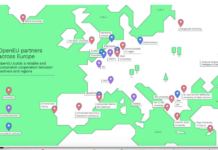Manitoba Association for Distributed Learning and Training
2009 International Conference
Call for Papers
The MADLaT 2009 conference will address the blend of information and communication technology with the wisdom of educators and trainers in learning environments. Our audience, a diverse community of practitioners, reflects this coming together–teachers, professors, instructors, trainers, instructional designers and those involved in student support, planning and administrative issues, all sharing their knowledge and experience.
We are inviting you to Red River College, Manitoba, May 7– 8, 2009 
The Conference Program Planning Committee is accepting submissions for presentations, panel discussions, facilitated discussions, and poster sessions. These will enable participants to investigate, evaluate, rethink, and connect with contemporary trends in information and communication technology, new media, and distance and distributed learning. We invite you to submit proposals for conference sessions that creatively address on of the sessions described below.
Who Should Submit?
This is an international conference. Submissions are strongly encouraged from individuals and groups working in education, training, business, industry, government, and military at all levels, including K-12, post-secondary, and adult education and/or training. Graduate students’ submissions in all formats are very welcome.
Conference Session Formats
• Presentations: Session presentations can be 20, 40, or 60 minutes in length and can include one or more presenters. The selected time should include time for audience questions.
• Panel discussions: Panel discussions must be 60 or 90 minutes in length, including time for audience questions, and should include between 3 and 6 panelists.
• Facilitated discussions: Facilitated discussions focus on audience participation throughout and are 60 minutes in length. They may have one or more facilitators but should be limited to a single topic.
• Poster presentations: Poster presenters will only be available to discuss their posters with conference participants at one pre-determined time.
• All submissions must address one of the streams.
• You are also invited to indicate if you wish your paper submission to be adjudicated for potential publication in a journal. If you make this request, you need to submit the final paper to the respective journal and the paper will go through the established peer-review process for the targeted journal.
Presentations, Panel Discussions, and Facilitated Discussions are invited in the following streams:
Stream 1: Participative Web
Focus on the applications of emerging technologies, such as social networking tools or mobile learning, and the education and training challenges created by the way the participative web is influencing many of the social and communication processes of society.
Stream 2: Teaching and Learning in a Changing World
Focus on addressing issues related to teaching and learning in environments of continual change.
Stream 3: Research
Focus on research about the implications of the increased use of technology in teaching and learning on different types of learners.
Stream 4: Educational Resources
Focus on the added value and issues directly related to the development and use of new media educational resources.
Stream 5: Organizational Planning for e-learning
Focus on issues and potential solutions that face education and training leaders, administrators, and service and support providers when integrating information and communication technology within the local, national, and international context.
Stream 6: The Workplace Learning
Focus on issues pertaining to the development of technology enabled training and performance support solutions for private industry.
Poster Presentations are invited in the following stream:
Poster presentations provide an opportunity to share innovative ideas and new applications of information and communication technology and distance and distributed learning. This may involve a report of a research study, an analysis of a practical problem-solving effort, a description of an international project, or the description of an innovative program that relates to the conference streams.
Language
The official language of the conference is English.
Proposal Selection Criteria
Proposals will be evaluated by the Proposal Selection Committee based on the following criteria:
• relevance to one of the conference streams;
• originality and contribution to research, pedagogy, policy, or practices;
• interest for specific MADLaT audiences; and
• clarity of the purpose of the session.
The Proposal
Complete the form below and mail, e-mail or fax your submission to:
Kathy Joss, MADLaT 2008 Conference Registrar
34 Gardner Cove
Winnipeg, MB Canada R2C 4X8
Phone: (204)793-9187
Fax: (204) 415-8690
E-mail: kjjoss@shaw.ca
The MADLaT 2009 Conference Presentation Proposal Form
1. Primary contact‘s information
Name:
Title (select one):
Dr. Prof. Ms Mr. Mrs. Miss
Organization (optional):
Address:
City:
Province/State:
Country:
Postal code/zip code:
Telephone number:
Fax number:
Email address:
Co-presenters (list the names of co-presenters with their titles):
2. Submission title:
3. Session type (select one):
• Presentation (Select preferred length):
20 minutes
40 minutes
60 minutes
Panel discussion (60 or 90 minutes)
Facilitated discussion (60 or 90 minutes)
Poster presentation
4. Abstract: Brief account of the content of the session (300 words maximum):
5. Stream (select one):
Stream 1: Participative Web
Stream 2: Teaching and Learning in a Changing World
Stream 3: Research
Stream 4: Educational Resources
Stream 5: Organizational Planning for e-learning
Stream 6: Workplace Learning
6. Intended audience (Select all that apply):
K-12
Post-secondary
Adult
7. Focus (Select all that apply):
Education
Training
8. Do you intend to submit a paper, based on this proposal, for peer review in the following journals?
a. Journal of Distance Education Submission Guidelines: www.jofde.ca
Yes / No
b. Canadian Journal of Learning and Technology Submission Guidelines: http://www.cjlt.ca/authors.html
Yes/No
9. Biographical note for each presenter (75 words maximum for each person).
Deadline for Submissions
Abstract Deadline: January 30, 2009
Results of the Selection Process
Those who submit proposals will be notified of the results by February 28, 2009. Conference presenters are expected to register and pay the conference registration fee, as well as their own travel and accommodation expenses.
Note: The Conference Program committee may request presenters to revise their submission and/or present jointly with others who have submitted proposals on similar topics. To ensure a balanced program, the committee reserves the right to solicit presentations in addition to those received through this Call for Papers.
After your abstract has been accepted:
Paper
Deadline: April 15, 2009
Format: If you have indicated in your submission that you wish your paper considered for publication, submit your paper to the respective journal web site. Be sure to use the appropriate style outlined by the journal to which you have chosen to submit.
Technology needs:
Requirements Deadline: March 15, 2009
After your abstract has been accepted, you will be notified to submit your technology requirements.









 Dr. Tony Bates is the author of eleven books in the field of online learning and distance education. He has provided consulting services specializing in training in the planning and management of online learning and distance education, working with over 40 organizations in 25 countries. Tony is a Research Associate with Contact North | Contact Nord, Ontario’s Distance Education & Training Network.
Dr. Tony Bates is the author of eleven books in the field of online learning and distance education. He has provided consulting services specializing in training in the planning and management of online learning and distance education, working with over 40 organizations in 25 countries. Tony is a Research Associate with Contact North | Contact Nord, Ontario’s Distance Education & Training Network.

